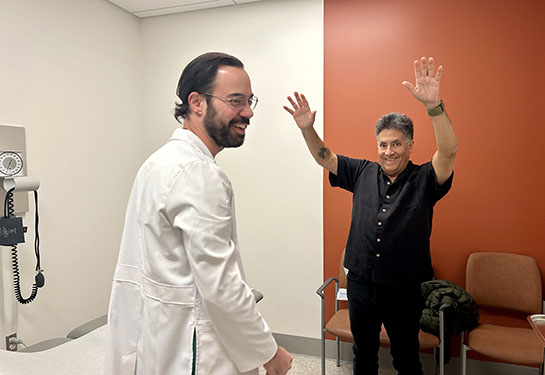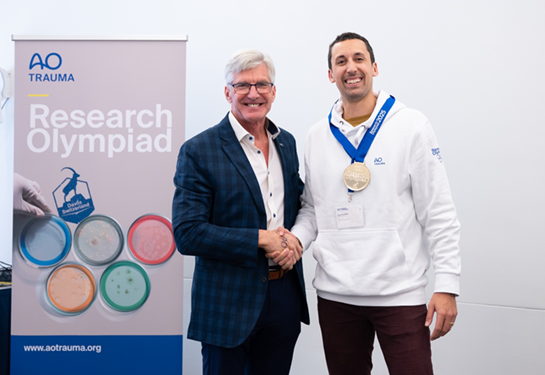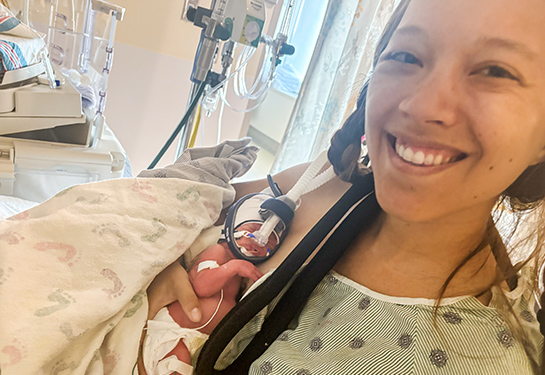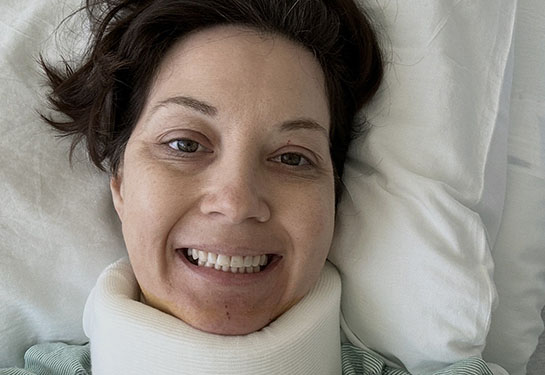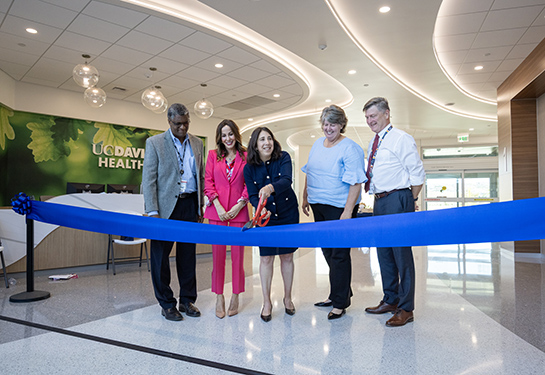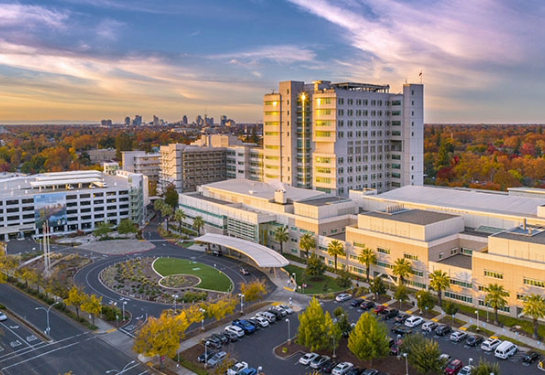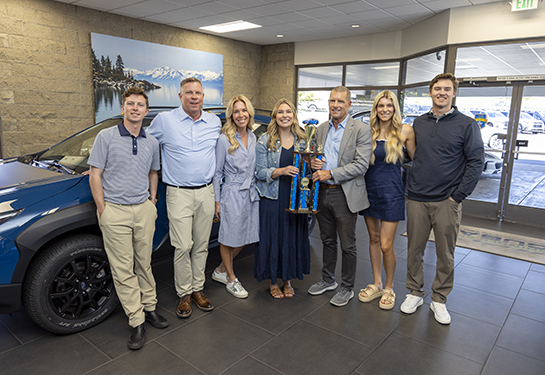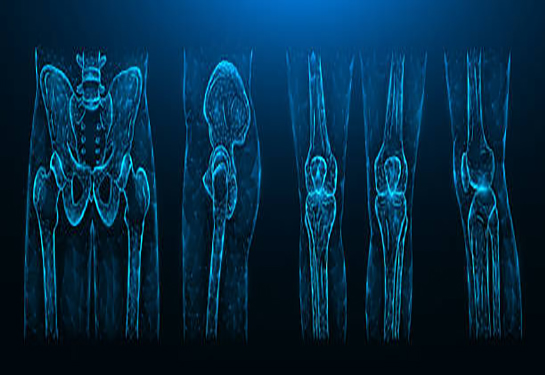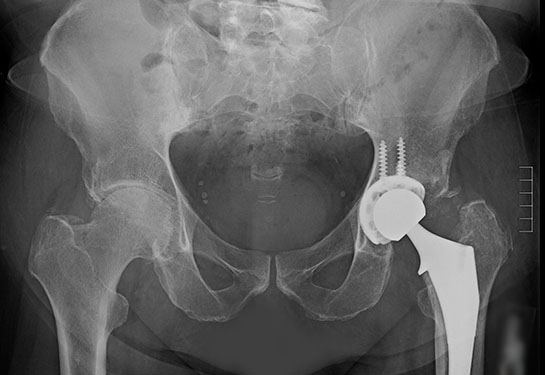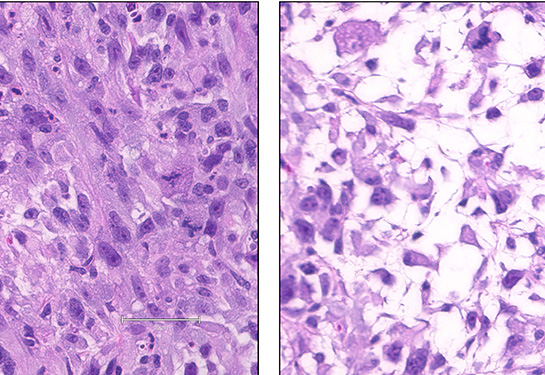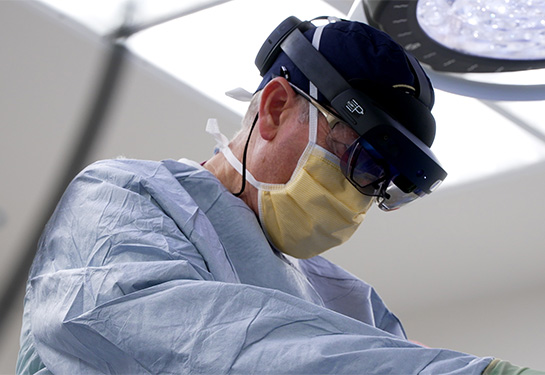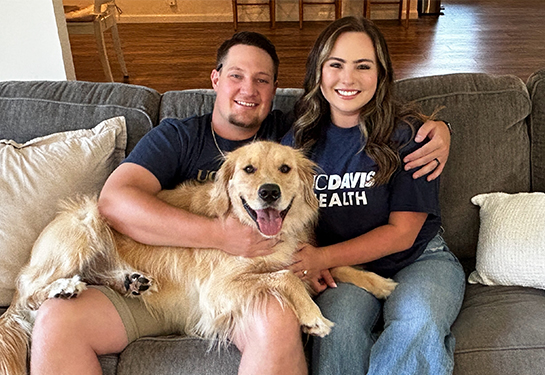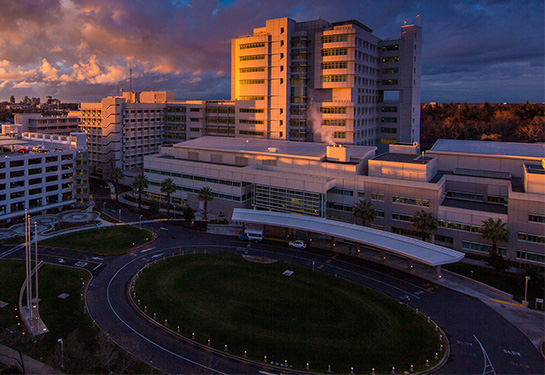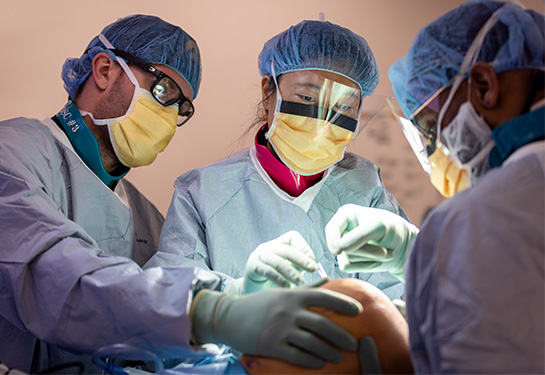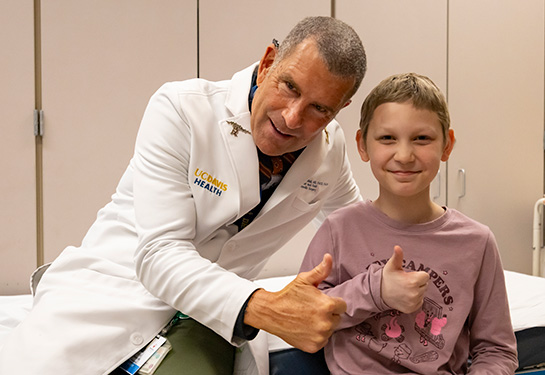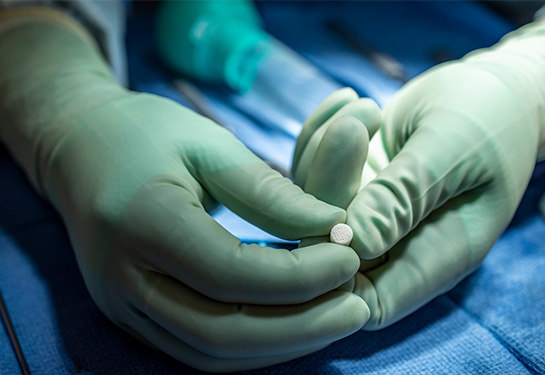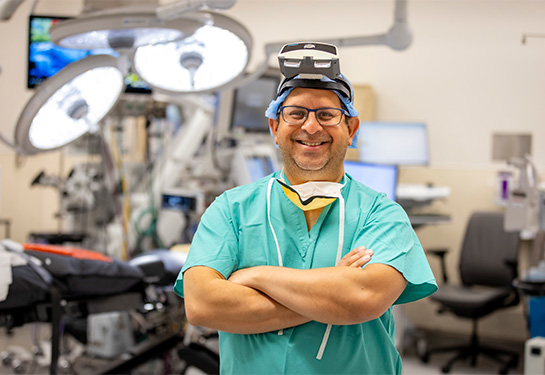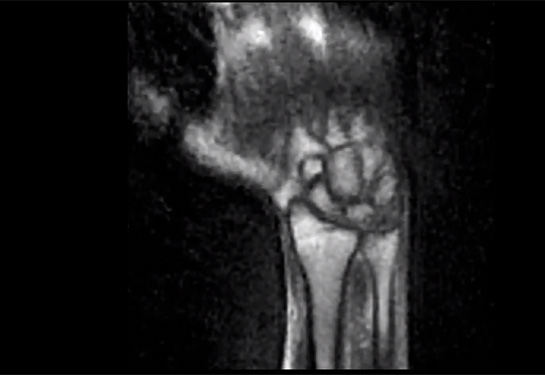-
February 11, 2026
Robotic-assisted reverse shoulder replacement gives patient back his mobility
UC Davis Health orthopaedic surgeon Mariano Menendez is one of a small group of surgeons nationwide offering the procedure, which ensures precise implant placement.
Read More
-
January 16, 2026
Pioneering fracture repair research wins gold in Switzerland
Augustine Saiz, a traumatologist at UC Davis Health, was awarded the Gold Medal for outstanding research at the third annual AO Trauma Research Olympiad held in Davos, Switzerland.
Read More -
January 15, 2026
Pregnant woman hit by car, UC Davis care team fights to save lives
A devastating accident almost claims the life of a pregnant woman. But her care team was there in a race against time.
Read More -
January 02, 2026
Innovative spinal implants relieve pain from degenerative disc disease
Procedure relieves severe neck and arm pain and numbness for emergency department nurse.
Read More
-
December 19, 2025
Mako SmartRobotics knee replacement helps retiree re-gain her mobility
Recent retiree Hilary Vos overcame severe knee pain with joint replacement surgery using Mako SmartRobotics now available at UC Davis Health. It often leads to quicker recovery times and longer-lasting joint implants.
Read More
-
October 07, 2025
U.S. News & World Report names UC Davis Children’s Hospital among the nation’s best
UC Davis Children’s Hospital is ranked among the nation’s 50 best in pediatric orthopaedics, pediatric nephrology and pediatric pulmonology and lung surgery.
Read More
-
September 18, 2025
UC Davis Health study finds potential keys to reversing bone loss
A new study from rheumatology and orthopaedic researchers reveals a promising new way to treat various bone loss conditions, including age-related osteoporosis.
Read More
-
August 21, 2025
Football injury leads to discovery of a tumor in boy’s leg
An 8-year-old boy needed treatment for an osteoid osteoma. His family turned to UC Davis Children’s Hospital to get him back in the game.
Read More -
August 15, 2025
‘A beacon for our community’: UC Davis Health unveils Folsom Medical Care Clinic
UC Davis Health has unveiled its new Folsom facility, which offers primary and specialty care and new services, including infusion, MRI and bone density scans.
Read More
Football injury leads to discovery of a tumor in boy’s leg | UC Davis Children's Hospital
UC Davis Health Unveils Folsom Medical Care Clinic
-
July 29, 2025
UC Davis Medical Center ranked as top hospital in the Sacramento region
UC Davis Medical Center is the No. 1 hospital in the Sacramento region and No. 7 in California, according to U.S. News & World Report.
Read More -
July 21, 2025
July is Sarcoma Awareness Month; Shingle Springs Subaru helps with race for a cure
It's Sarcoma Awareness Month. Shingle Springs Subaru is honored by cancer center for raising support and money for research to fight the disease.
Read More -
July 15, 2025
Orthopaedic Surgery receives over $2.2 million in research funding from defense department
More than $2.2 million in Department of Defense research funding is headed to Orthopaedic Surgery scientists to study bone and joint health.
Read More
-
June 13, 2025
‘It’s been a life changer’: Complex hip replacement surgery allows doctor to walk upright again
Michael McGrath’s complicated medical history caused some surgeons to turn down his request for surgery to restore his mobility. Thanks to a UC Davis Health orthopeadic surgeon, he’s back on his feet.
Read More
-
January 08, 2025
Meniscus tears in kids and teens are on the rise. What’s the best treatment?
UC Davis Health pediatric orthopaedic surgeon Brian Haus is leading a North American effort to find the best treatment for meniscus tears in young patients.
Read More -
January 03, 2025
Do collagen, omega-3 and whey supplements help your bones?
In a Q&A, Professor of Neurobiology and Physiology Keith Baar discusses the effects of collagen, whey protein and omega-3 supplements on bone, tendons and joint health.
Read More
-
November 15, 2024
Two decades in the making: Scientists discover molecule that strengthens bones
A team of scientists at UC Davis and UCSF have identified a molecule that increases bone density and strength and could lead to treatment of osteoporosis.
Read More
-
October 23, 2024
Orthopaedic project aims to reduce children’s exposure to opioids
Surgeon Amanda Whitaker has received a grant from the Pediatric Orthopaedic Society of North America to study how to reduce opioid use in children.
Read More
-
September 23, 2024
Orthopaedic Surgery supports pediatric patients through cancer diagnosis, treatment
The Department of Orthopaedic Surgery raises awareness during Childhood Cancer Awareness Month.
Read More -
September 16, 2024
New tumor models provide insights into deadly sarcomas
Researchers at UC Davis and UCLA have created models for four sarcoma subtypes using stem cells. The findings may lead to new therapies.
Read More -
September 16, 2024
The future of surgery: Using augmented reality goggles in the operating room
Otolaryngology surgeons are at the forefront of using augmented reality in surgeries. They are evaluating how this leading-edge technology can improve surgical procedures.
Read More
Mixed Reality Goggles Guide Complex Surgeries - Driving Discovery
-
August 13, 2024
Pickleball injuries are on this rise. Here are 10 tips to avoid them while playing.
Pickleball injuries, like fractures, ligament ruptures and muscle strains, are on the rise. UC Davis Health orthopaedic surgeons share tips to stay safe while playing this popular sport.
Read More
Pickleball Injuries - Orthopaedic Surgeons Explain Common Injuries and How to Avoid Them
-
July 25, 2024
Student inspired to study medicine after rural surgeon heals his broken finger
A finger injury at age 14 set Noah Lyndall on a path that brought him to the School of Medicine where he is among 139 new, first year students.
Read More -
July 16, 2024
U.S. News ranks UC Davis Medical Center among nation’s best
U.S. News and World Report has once again ranked UC Davis Medical Center among the nation’s best in its prestigious best hospitals survey.
Read More
-
May 08, 2024
Orthopaedic surgeon among first to place new shock absorber implant for knee pain
Orthopaedic surgeon Cassandra Lee performed a leading-edge procedure with a new implant called the MISHA Knee System that alleviated the chronic pain of a firefighter who underwent 11 previous surgeries.
Read More
'Shock Absorber' for Knee Pain - UC Davis Among First to Place MISHA Implant for Osteoarthritis
-
April 12, 2024
Surgeons use collarbone to create new upper arm for young cancer patient
When Sydney Engle was diagnosed with osteosarcoma, her parents put their trust in UC Davis Children’s Hospital and R. Lor Randall.
Read More
-
March 22, 2024
New implant helps repair knee cartilage in UC Davis Health patients
A UC Davis Health orthopaedic surgeon is among the first in the country to implant a new resorbable device to repair knee cartilage.
Read More
-
February 28, 2024
Patient perspective gains importance in evaluating surgery success
Medicaid and Medicare will soon require patient perspectives when assessing the success of certain surgeries, a practice UC Davis Health has been doing for years.
Read More
-
December 05, 2023
UC Davis Health surgeon takes game-changing approach to spine surgery with augmented reality
The Department of Orthopaedic Surgery has added a vice chair of surgical innovation who is a pioneer in using augmented reality glasses during surgeries.
Read More
-
October 13, 2023
Real-time MRI captures wrists in motion
A new study led by UC Davis researchers shows that a new, low-field MRI system can create clear videos of moving wrists.
Read More
-
September 18, 2023
Engineered bone marrow shows promise as cancer treatment
The development of engineered bone marrow is revolutionizing research and treatment for osteosarcoma, the most common malignant bone cancer in children.
Read More

